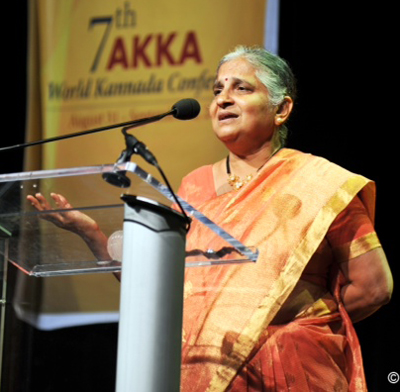|
BY VEENA RAO

Atlanta,
September 2012: The women’s business seminar at AKKA was a big draw for
both women and men. Infosys Foundation chairperson, Sudha Murty spoke
on the topic, 'Modern Woman – Reaching your full potential'. Dr Nalini
Saligram of Arogya World was the second speaker at the forum.
“Women
have undefined, unlimited potential. (It is up to them to) harness it
and get ahead,” said Sudha Murty, in a 20 minute address that was laced
with humor and spoken from the heart. The audience hung on to her every
word and broke into applause, often. “Women often put chains on
themselves; it is in their imagination,” she said, adding, “They’ve got
to have the mindset to achieve.”
“Behind every successful man is
a dumb woman,” she said, in a self deprecating reference to her own
personal story (Sudha Murty is the wife of Infosys founder N. R.
Narayana Murthy.) “But behind every successful woman is an
understanding man.”
“The divorce rate is higher these days
because women today are exercising their freedom. Men need to be
understanding and allow their women to blossom.”
Murty said she
believes women are actually better than men. They undergo several
physical and emotional changes in life, and play several roles- as
daughter, sister, daughter-in-law, mother, grandmother etc. This has
given women the ability to adapt. “Women can be good managers,” she
said, adding with a twinkle in her eye, “Man thinks he is the head of
the family. Give him that false hope. His ego is fragile.”
In a
changing world, each generation of women face a set of different
challenges, she said, adding that in her personal opinion, it helps to
compartmentalize your personal and professional life. “I did not play
the female card or ask for concessions at work,” she said, and exhorted
women to “Be professional.”
She added that she was lucky to have good family support.
Murty
said she did not believe in having role models. “Parents are the best
role models for children.They lead by example.” She illustrated her
point with an example of how she convinced her children they did not
need more than they have use for, by taking them on a tour of the slums
and showing them the life of children there. “If you need 10 dresses,
don’t have more. Do not amass,” she told them.
When her daughter
asked her why she did not ever wear make-up, she told her what she
believed- that true beauty lies in a compassionate heart.
Still
on parenting, she said, “Don’t make decisions on behalf of your
children. Be there to guide them. Our dreams are limited to ourselves.
Be magnanimous when it comes to your kids.”
In conclusion,
Murty said in her inimitable style: “Life is like a thali. Each
person’s katori is of a different size. Make your thali nutritious and
delicious.”
Later, in response to a question on philanthropy,
she said, “You do not need money to become a philanthropist. You need
love for your fellow human being,” adding, “Any giving which is not a
business deal, not a ‘you scratch my back, I scratch yours’ deal, and
for which you expect nothing in return, is philanthropy.”
The
second speaker, Nalini Saligram is a global health advocate and founder
& CEO of Arogya World. Arogya World is a U.S. based non-profit
organization working to reduce the global impact of chronic
non-communicable diseases (NCDs), one community at a time.
Dr
Saligram provided an overview of NCDs and its risk factors. “Last year,
the UN Global Summit on NCDs declared non-communicable diseases as the
biggest health and developmental challenge of the century. Two out of
three deaths in the world and 80% of the deaths in the developing world
are due to NCDs,” she said. “The cost of inaction is $30 trillion in 20
years, while the cost of action (through education on lifestyle
changes) is much less at $11 billion.”
“Women are the smart solution to tackle NDCs,” she said. “The icon of the thali is certainly empowering.”
Post
Comment

|

